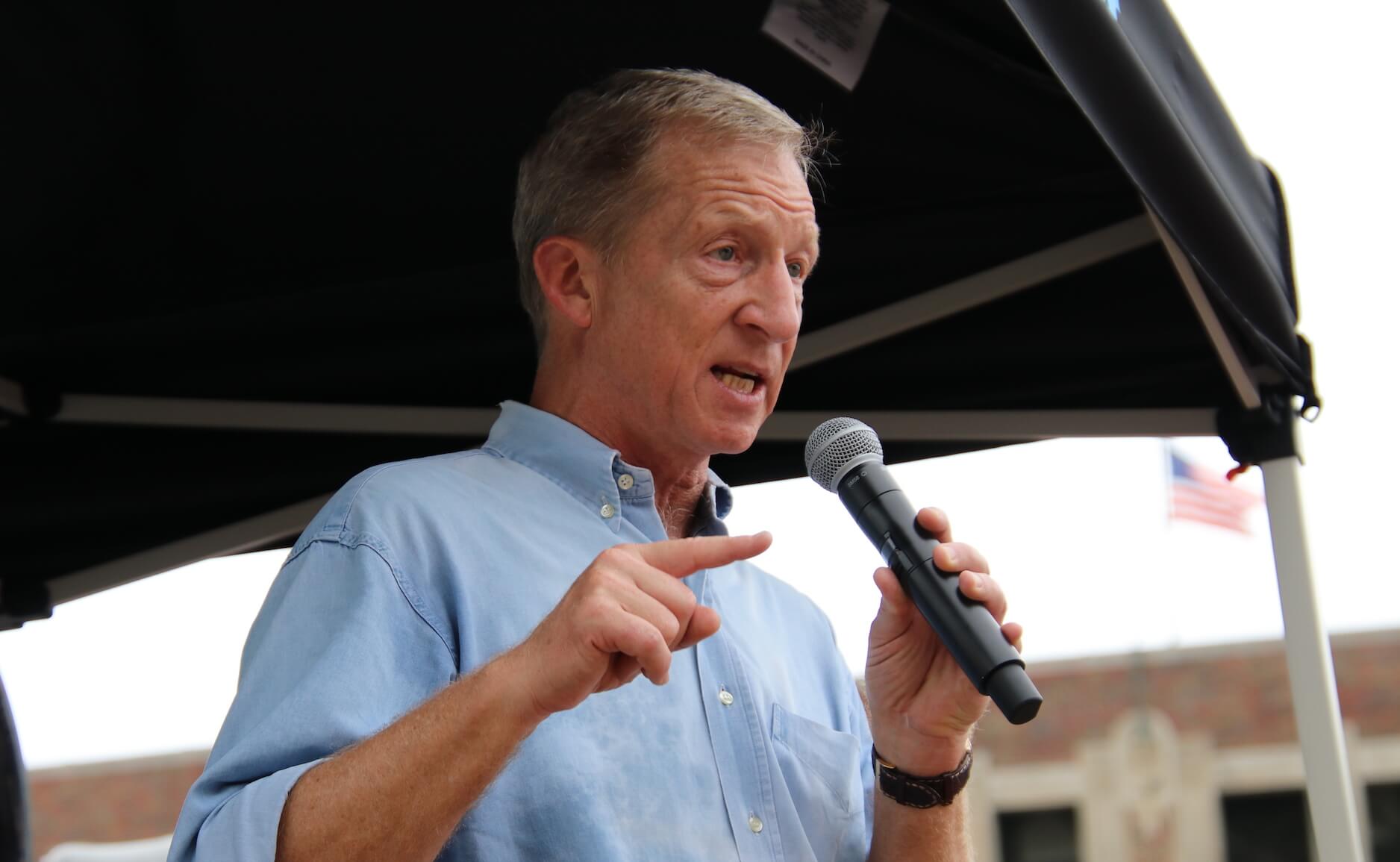
When Tom Steyer visited Crescent last week to tour damage of western Iowa’s third round of major flooding in six months, he was asked a climate question beginning with the clause, “If the science is true … ”
Steyer, a Democratic presidential candidate and former California businessman, had a visceral reaction to the statement because he said it was damaging to frame climate change as a question.
“I don’t mean to be rude. I don’t need to be a know-it-all. But you can’t say, ‘If the science is true.’ There is no other side to the scientific question,” Steyer said. “When people deny the science or try and come up with false equivalence, I really don’t put up with it because it’s so dangerous.”
Steyer, who has vowed to declare climate change a national emergency if elected president, on his recent trip to the state said he engaged in productive conversations with people impacted by the continued flooding in western Iowa. There was discussion of the connection between local devastation and climate change, among other aspects of disaster recovery, like the mental health impact of being a domestic climate refugee.
[inline-ad id=”0″]
“I wanted to see what was going on in the western part of Iowa,” Steyer said. “I was very interested to see what was going on, what the government was doing about it, what the implications were for the people who were living there.”
The Missouri River, which runs along Pottawattamie County’s western edge, crested near 30 feet in late September. Flood waters led to damage or total destruction of homes and fields in the county, bringing with it interruptions to agricultural livelihoods in some cases.
Local and global research has consistently linked climate change with extreme flooding. Recent reports by the Iowa Policy Project following March’s round of devastation found the state’s flooding will worsen in the coming years as the world grows warmer, though some community members link the rising waters to the Army Corps of Engineers’ management of the Missouri River.
“There’s a fair bit of anger, in that part of Iowa, about the way the Army Corps of Engineers has handled the Missouri, at least the control of the dams on the Missouri River and the levees,” Steyer said.
[inline-ad id=”1″]
Steve Hultman, a member of the citizen’s climate lobby in Iowa and a resident of Crescent, recently told Starting Line his neighbors don’t always acknowledge the link between flooding and climate change.
“Our neighbors take it one day at a time,” Hultman said. “They say, ‘We’ve adapted before, so we’ll adapt again.’”
But Steyer said he hoped to prevent flooding instead of dealing with relief efforts.
“Beyond that, there’s a question of how do we prevent so many of these incidents and how do we prevent them from increasing severity?”
To cope with new realities of constant flooding, Steyer has released a global climate change plan which expands on justice-centered policies to emphasize the importance of global leadership and collaboration.
[inline-ad id=”2″]
“I’m somebody who would make it the number one priority. I’m the only person who will say that. I’m the first to say this is the number one priority in our foreign relationships. We have to solve this,” he said.
Crescent is represented by Democratic Congresswoman Cindy Axne, but also by state Rep. Jon Jacobsen, R-Council Bluffs, and state Sen. Tom Shipley, R-Nodaway. Steyer said it was important to have conversations about climate change in a politically split community like Crescent.
“That part of Iowa is, at best purple,” he said. “There are a lot of people there who, prior to this, might not have wanted to believe that collective climate was changing and that was caused by human activity.”
But last week’s events were well-attended, Steyer said, and people there were receptive to discuss the connection between climate and human activity.
“I don’t think that we are nearly at a point where people understand that this is their first priority. There’s no one else in this race who will say it’s the first priority, but now people are seeing the issue firsthand,” Steyer said. “Let’s be honest. The turnout was much better than we expected.”
By Isabella Murray
Photo by Julie Fleming
Posted 10/8/19

Iowa Republicans make outlawing gay marriage key 2024 campaign priority
Iowa Republicans have made outlawing gay marriage a key goal in their 2024 party platform. During the Iowa GOP’s 2024 state convention on Saturday,...

Department of Justice says Iowa immigration law violates US Constitution
If Iowa doesn’t suspend the enforcement of its new immigration law by May 7, the state could face a federal lawsuit, according to the Des Moines...

Rushing: Iowa State president said the quiet part out loud
I want to thank Iowa State University President Wendy Wintersteen for doing us all a favor by finally saying the quiet part out loud: all the...

Iowa sets aside almost $180 million for year two of voucher program
Iowa has committed nearly $180 million in taxpayer funds to support private school tuition in the 2024-25 school year, which is almost $50 million...

Kalbach: Immediate action needed on corporate ag pollution
Iowa agriculture has undergone substantial changes over the past 40 years. We see it all around us. Rather than crops and livestock being raised on...

VIDEO: Jochum calls Gov. Reynolds’ summer meal program a ‘hunger game’
Iowa Gov. Reynolds announced a competitive $900,000 grant program to feed Iowa children over the summer, months after she declined $29 million in...




